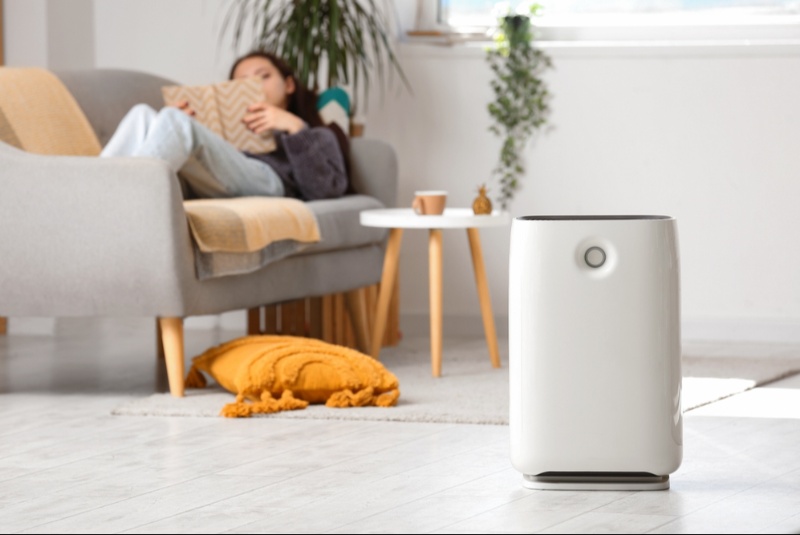Selecting the right air purifier can significantly improve your indoor air quality, providing a healthier environment by removing pollutants, allergens, and other harmful particles. With numerous options available, it’s essential to understand the key features that differentiate high-quality air purifiers. This comprehensive guide explores what to look for when choosing an air purifier, ensuring you make an informed decision for your home or office.
Understanding Air Purifier Types
There are several types of air purifiers, each utilizing different technologies to clean the air. HEPA (High-Efficiency Particulate Air) filters capture particles as small as 0.3 microns, making them effective for removing dust, pollen, and pet dander. Activated carbon filters excel at removing odors and chemical pollutants. UV-C purifiers use ultraviolet light to kill bacteria and viruses. Ionic purifiers release charged ions to attract and neutralize particles. Understanding these types ensures you choose an air purifier that meets your specific air quality needs.
Evaluating CADR Ratings
The Clean Air Delivery Rate (CADR) is a crucial metric that indicates how effectively an air purifier can clean the air in a given space. CADR ratings measure the volume of filtered air delivered, with separate scores for smoke, pollen, and dust. Higher CADR ratings indicate better performance and faster purification. When choosing an air purifier, consider the size of the room and select a model with appropriate CADR ratings to ensure efficient air cleaning. Evaluating CADR ratings ensures your air purifier can handle the room size effectively, providing optimal air quality.
Checking Filter Quality and Replacement
The quality and longevity of the filters are essential for an air purifier’s performance. HEPA filters are highly effective but need regular replacement to maintain efficiency. Some models feature washable pre-filters that extend the life of the primary filter. Activated carbon filters should also be replaced periodically, especially if used to remove strong odors or smoke. Check the availability and cost of replacement filters before purchasing. Ensuring high-quality and easily replaceable filters guarantees long-term effectiveness and cost-efficiency.
Considering Noise Levels
Noise levels can significantly impact your comfort, especially if you plan to use the air purifier in a bedroom or office. Air purifiers with multiple fan speeds often allow you to choose a quieter setting for nighttime use. Look for models that specify noise levels in decibels (dB) to compare options. Some purifiers are designed with noise-reducing features or silent operation modes. Considering noise levels ensures your air purifier operates without causing disturbance, enhancing your overall comfort.
Assessing Energy Efficiency
Energy efficiency is an important consideration, particularly if you plan to run your air purifier continuously. Look for models with Energy Star certification, which meet strict energy efficiency guidelines. Energy-efficient purifiers not only reduce your electricity bills but also have a smaller environmental footprint. Assessing energy efficiency ensures you choose a cost-effective and environmentally friendly air purifier that can run efficiently without consuming excessive energy.
Analyzing Room Size Compatibility
Selecting an air purifier that matches the size of your room is crucial for effective air cleaning. Manufacturers typically specify the maximum room size their purifiers can handle, often in square feet. Measure your room and choose a purifier that can cover at least that area. For larger spaces, consider air purifiers with higher CADR ratings or multiple units for comprehensive coverage. Analyzing room size compatibility ensures your air purifier can maintain high air quality throughout the entire space.

Considering Additional Features
Many modern air purifiers come with additional features that enhance convenience and functionality. Look for purifiers with air quality sensors that adjust fan speeds based on real-time air quality. Smart connectivity features, such as app control and compatibility with voice assistants, offer remote management and monitoring. Timer functions, sleep modes, and filter replacement indicators are other useful features. Considering these additional features ensures you select an air purifier that is easy to use and suits your lifestyle.
Evaluating Maintenance Requirements
Regular maintenance is necessary to keep your air purifier running efficiently. Check how easy it is to access and replace filters, clean the unit, and perform any other required maintenance tasks. Some models have filter change indicators or automated cleaning functions to simplify maintenance. Evaluating maintenance requirements ensures you can keep your air purifier in optimal condition with minimal effort, prolonging its lifespan and maintaining its performance.
Checking for Warranty and Customer Support
A good warranty and reliable customer support are important factors when purchasing an air purifier. Look for models that offer at least a one-year warranty, with longer warranties being preferable. Check the manufacturer’s reputation for customer service, including availability of support and responsiveness to issues. Reading customer reviews can provide insights into the reliability and service quality of the brand. Ensuring a good warranty and customer support provides peace of mind and protection against potential issues.
Considering Portability and Design
If you plan to move your air purifier between rooms or want it to blend seamlessly with your home decor, consider its portability and design. Lightweight models with handles or wheels are easier to transport. Sleek, modern designs can complement your home’s aesthetics. Some purifiers are designed to fit into small spaces or can be mounted on walls. Considering portability and design ensures your air purifier is both functional and visually appealing, fitting well into your living environment.
Comparing Costs and Budget
Air purifiers come in a wide range of prices, from budget-friendly options to high-end models with advanced features. Determine your budget and prioritize the features that are most important to you. While higher-priced purifiers often offer better performance and more features, there are many affordable options that provide excellent air cleaning. Comparing costs helps you find a purifier that offers the best value for your money, ensuring you make a cost-effective purchase without compromising on quality.
Reading Reviews and Seeking Recommendations
Customer reviews and expert recommendations can provide valuable insights into the performance, reliability, and satisfaction of different air purifier models. Look for detailed reviews that discuss ease of use, filter replacement, noise levels, and overall performance. Professional reviews and consumer reports offer in-depth analysis and comparisons. Additionally, seek recommendations from friends, family, or online communities. Reading reviews and seeking recommendations ensures you make an informed decision based on real-world experiences and expert opinions.
Testing Before Purchase
If possible, test the air purifier before making a purchase. Visit stores that offer display models you can try. Assess the build quality, ease of use, and noise levels. Pay attention to how well the purifier handles different room sizes and types of pollutants. Testing before purchase ensures you choose a model that meets your comfort and functional needs, avoiding potential issues after buying.
Supporting Reputable Brands
Choosing a reputable brand known for quality and innovation can enhance your confidence in your purchase. Established brands often provide better customer support, more comprehensive warranties, and a wider range of replacement parts and accessories. Research brands with a history of producing reliable and high-quality air purifiers. Supporting reputable brands ensures you invest in a purifier that is built to last and backed by reliable service.
Selecting the right air purifier involves understanding different types, evaluating CADR ratings, and considering filter quality and replacement. Assessing noise levels, energy efficiency, and room size compatibility are essential for effective air cleaning. Exploring additional features, evaluating maintenance requirements, and ensuring good warranty and customer support further guide your decision. Considering portability, design, and costs, and reading reviews and recommendations provide additional assurance. Use this guide to navigate the market confidently and find the perfect air purifier that offers optimal air quality and meets your needs.




